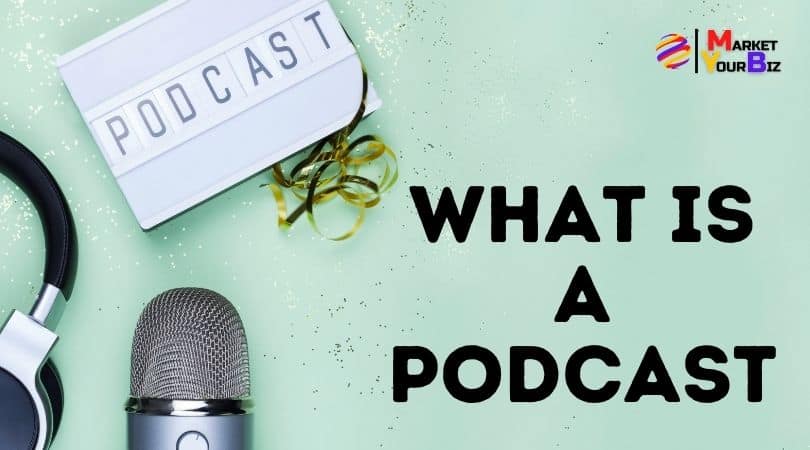A Podcast is a digital audio file made available on the internet for downloading to a computer or mobile device, typically known as a series of new installments of which subscribers can receive subsequently.
Podcasts are offered in two basic models – the stand-alone podcast and the syndicated podcast. The stand-alone podcast is simply a file made up of one or more interviews with guests who have agreed to be interviewed. They’re offered in two different ways. First, those offering the podcast download the podcast in their podcast directory. Second, they offer a link on their site which visitors can click on to go to the podcast download page. There’s no need to download the actual podcast in your web browser, but if you want to, you can.
Podcast directories, on the other hand, provide a place where podcasters can submit their podcasts for free. Those who have chosen to submit their podcast for free typically set up a website containing information about their podcast and announcing new episodes. Some podcasters who choose to submit their podcast for a fee usually do so via a podcast directory. Podcast directories are very convenient because there are literally thousands of podcast types to choose from.
The second major distinction between podcast directories and podcast hosts is that podcast hosts typically upload their podcasts to their own servers and host them using their own software. Podcast hosts typically download their podcasts from online resources like podcast directories. Podcast hosts have the advantage of knowing their listenership and what topics people are interested in. If a podcast host has an interest in a subject but not enough fans to make it worth his time, he can often just stick it in a podcast directory and make a tiny commission.
Both podcast directories and podcast hosts provide plenty of options for podcast downloads. In addition to genres that fall into general categories, most podcast hosts and directories offer podcasts about specific topics. For example, if a podcast host wanted to offer an iTunes podcast on dog training, he could search for a podcast dedicated to that topic. While this does take some of the burdens off of the hosts, it can also limit podcasting options to only certain formats, such as WMA or FLV.
Another significant difference between podcast directories and podcast hosts is that podcast directories often provide links to free download websites where podcast listeners can download individual podcasts at no cost. These podcasts may be part of paid membership programs. When downloaded directly from the podcast directory, podcast files usually have no commercial breaks or advertising involved. The only expense may be the cost of hosting. Typically, there are no commercials allowed on podcast directories, so listeners have to decide whether or not the adverts on the podcast are worth the price of the podcast itself.
While podcast directories offer some benefits to both podcast hosts and podcast listeners, podcast directories are often considered the podcasting “high school” for newbie radio producers. There is a lot of learning curve. Unless the podcast host has experience in podcast production, producing and uploading podcasts can be difficult, time-consuming, and expensive. If you want to podcast, it is best to learn the ropes from someone who has been there before.
The main benefits of podcasts are given below
1) Make information personal
The content is directly communicated to you; hence it is more personal than emails.
2) Are convenient and easy to consume.
Once subscribed, other podcasts in the same field are automatically downloaded to your PC, and you can listen to them at your convenience.
3) Are economical
Podcasts are delivered digitally; hence, they are more cost-saving than other means of communication; many associated costs can be avoided.
4) Facilitate multitasking
You can listen to podcasts while attending other tasks or while commuting. At times meetings can be substituted with podcasts.
5) Are portable
Once stored on a PC, mobile, or any other compatible device, you can carry it anywhere.
6) Are on-demand technology
Listeners decide the type of content or specific information, explanation, and so on. It is an effective way to express your ideas, make good publicity of your merchandise and so on.
7) Are ideal tools for social networking
The subscribers to your podcasts are the base of your community and ideal for cross-selling and loyalty encouragement.
Most Popular Podcast Formats
The Interview Format
A host or two invite a guest to discuss any pre-decided topic, or there can be a brief session of Q and A to get more clarity on the subject. As this format is one of the most popular designs, your presentation, discussion, and overall content has to be par excellence.
Solo or Monologue Format
It is a prevalent format. It is mainly used by people having specific expertise on a subject. It is the most straightforward format since only a good quality microphone and editing software are required. The duration should be below thirty minutes; else, the listeners lose focus.
The conversational or co-hosted format
Two people are involved in this format, and their chemistry has to be fully in sync. Their roles are generally decided to avoid any confusion. The listeners expect that both persons complement each other. The involvement of two people is more lively and cheerful for the listeners.
Panel Format
A single host discusses a topic with two or three guests. This format is a tough one right from the beginning as you have to coordinate with the guests for a fixed schedule. You should have the knack to keep each guest involved and, at the same time, prevent tactfully and politely the overlapping of a guest by another. The discussion should not be diverted to another direction than the core subject.
Non-fictional storytelling format
It is based on actual events, expeditions, some incident,s and so on. People like this format as they get new concepts, ideas or any exciting happenings. The effect of the podcast can be enhanced with the relevant audio clips or sound. Consistency is challenging in this format.
Theatre Format
This format is popular for fictional storytelling. There is the scope of adding sound effects, use multiple voices and make more dramatic. Creative people love this format.
Repurposed Content format
Existing content is selected and transformed to enhance its effect. It can be done by splitting, or any addition may be made. Religious organisations use this format to reproduce content from scriptures and make it more transparent and exciting.
Non-traditional Format
You can use your creativity and design your format. Just like writing, this is a creative type of podcast. You can experiment with making your presentation more effective and appealing.
The standard media formats for the podcast are MP3 and M4A audio andMP4 for video formats.




0 Comments